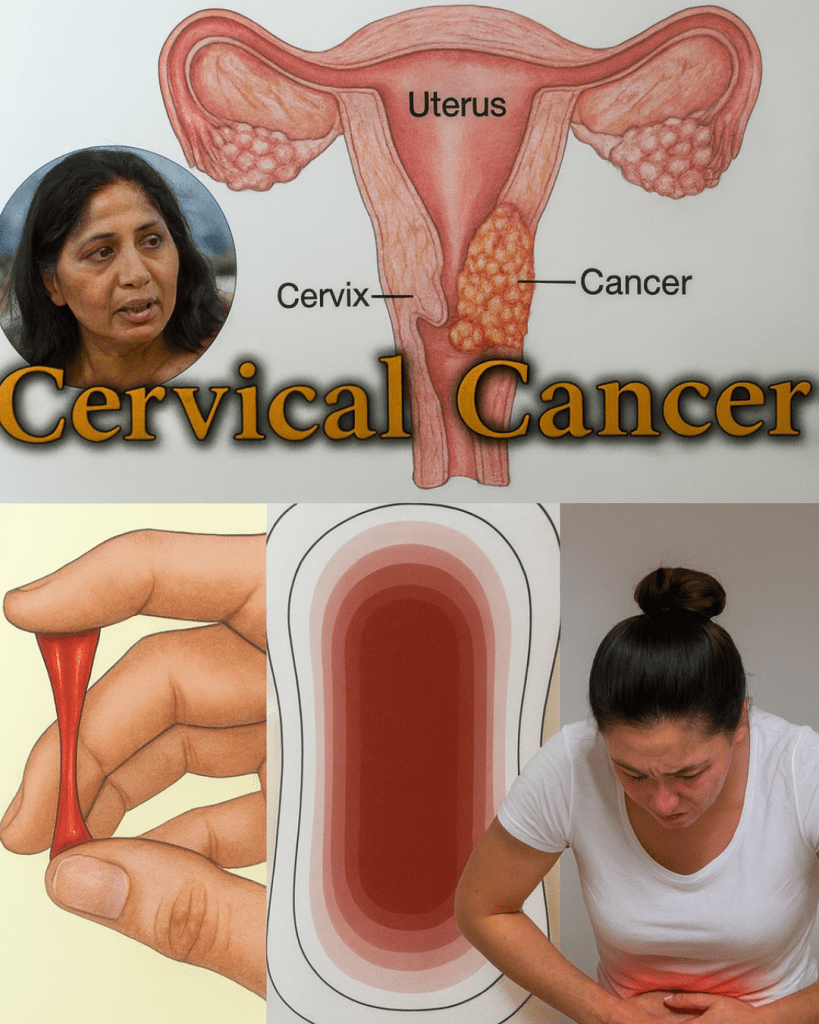Your uterus is a powerhouse—an organ that does far more than support pregnancy. It’s a key player in your overall health, quietly working behind the scenes. But when something’s wrong, it doesn’t always make a loud fuss. Instead, it whispers through subtle symptoms that are too easy to brush off as “just a bad period” or “normal fatigue.” Ignoring these whispers can lead to serious conditions like endometriosis, fibroids, infertility, or even cancer. The stakes are high, and your body is counting on you to listen.
What if those cramps, irregular cycles, or unexplained exhaustion are your uterus crying for help? This article uncovers 12 critical warning signs that demand your attention. Designed to keep you engaged and informed, we’ll dive deep into each symptom, why it matters, and what you can do to protect your health. Let’s empower you to take control—because your uterus deserves to be heard.

🩺 1. Irregular Periods: When Your Cycle Goes Off Track
A predictable menstrual cycle is a sign of balance, but when your periods become erratic—too short, too long, or completely unpredictable—it’s a red flag. Hormonal imbalances, uterine fibroids, or polycystic ovary syndrome (PCOS) could be disrupting your rhythm. Missing periods (when pregnancy isn’t the cause) or sudden changes in cycle length are never “just normal.” They’re your body’s way of signaling that something deeper needs attention. Track your cycle diligently and consult a gynecologist if patterns shift unexpectedly.
🩸 2. Heavy Menstrual Bleeding: More Than Just Inconvenience
Soaking through pads or tampons every hour? Needing to double up on protection or waking up to change them at night? Heavy menstrual bleeding, known as menorrhagia, is not just an annoyance—it’s a warning. Uterine fibroids, adenomyosis, or hormonal imbalances could be to blame. Left unchecked, excessive bleeding can lead to iron deficiency anemia, leaving you exhausted and weak. If your periods feel like a flood, it’s time to seek answers from a healthcare provider.
🔥 3. Severe Menstrual Cramps: Pain That Stops You in Your Tracks
Mild cramps are part of many women’s cycles, but debilitating pain that leaves you curled up in bed is not. Severe menstrual cramps could point to endometriosis, where tissue similar to the uterine lining grows outside the uterus, or fibroids, which are benign growths that can distort the uterus. If your cramps disrupt your daily life—work, social plans, or even sleep—don’t normalize the suffering. A doctor can help identify the root cause and offer relief.
⚠️ 4. Pelvic Pain Outside Your Period: A Persistent Warning
Pain in your pelvic area that lingers beyond your period is a serious signal. Conditions like ovarian cysts, pelvic inflammatory disease (PID), or chronic uterine inflammation could be the culprits. Unlike period cramps, this pain doesn’t follow a predictable cycle and may feel like a constant ache or sharp stabs. If pelvic discomfort lasts more than a few days or worsens over time, don’t dismiss it—schedule a gynecological exam to uncover the cause.
😣 5. Pain During Sex: Intimacy Shouldn’t Hurt
Sex should be pleasurable, not painful. If you experience discomfort or sharp pain during intercourse, your uterus may be signaling a problem. Endometriosis, uterine infections, or structural abnormalities like fibroids could be interfering. Painful intimacy is not something to endure silently—it’s a clear sign your body needs attention. Speak openly with your doctor about this symptom; it’s not “in your head,” and it’s not something you have to live with.

🚨 6. Unusual Vaginal Discharge: A Change You Can’t Ignore
Your vaginal discharge is a window into your reproductive health. Healthy discharge is typically clear or white, with minimal odor. Sudden changes in color (yellow, green, or gray), consistency (clumpy or watery), or smell (foul or fishy) could indicate bacterial vaginosis, yeast infections, or sexually transmitted infections (STIs). These conditions can affect your uterus if left untreated, potentially leading to complications like PID. Pay attention to changes and seek medical advice promptly.
💧 7. Frequent Urination or Bladder Pressure: More Than a Nuisance
Feeling like you need to pee constantly or experiencing pressure in your lower abdomen? Uterine fibroids, ovarian cysts, or an enlarged uterus could be pressing against your bladder, causing these symptoms. These growths can disrupt normal bladder function, making you feel like you’re never fully relieved after urinating. If urinary changes persist or are accompanied by other symptoms like pelvic pain, it’s time to investigate with an ultrasound or gynecological exam.
🔍 8. Lower Back Pain: Not Just About Posture
Lower back pain is often blamed on poor posture or long hours at a desk, but for women, it can stem from uterine issues. Fibroids, endometriosis, or uterine prolapse (when the uterus slips from its normal position) can cause persistent backaches, especially if paired with period irregularities or pelvic pain. If your lower back pain feels tied to your cycle or other reproductive symptoms, don’t assume it’s just a muscle issue—consult a specialist to rule out uterine causes.
💤 9. Unexplained Fatigue: When Your Uterus Drains Your Energy
Feeling exhausted no matter how much you rest? Heavy menstrual bleeding, often caused by fibroids or adenomyosis, can lead to iron deficiency anemia, sapping your energy and leaving you foggy or weak. Fatigue is more than a busy lifestyle—it could be your uterus signaling distress. A simple blood test can check your iron and hemoglobin levels, and addressing the root cause, like heavy periods, can restore your vitality.
🧬 10. Difficulty Getting Pregnant: A Silent Struggle
Struggling to conceive can be heartbreaking, and uterine issues are often a hidden cause. Problems with the uterine lining, blocked fallopian tubes, or structural abnormalities like fibroids or polyps can interfere with fertility. These conditions may not cause obvious symptoms, making them “silent” barriers to pregnancy. If you’ve been trying to conceive without success, a fertility specialist can evaluate your uterus and recommend targeted treatments to improve your chances.
⚠️ 11. Spotting Between Periods: A Subtle but Serious Sign
Light bleeding or spotting between periods is not just an inconvenience—it’s a potential warning. Uterine polyps, hormonal imbalances, or, in rare cases, early signs of endometrial cancer could be the cause. If you’re post-menopausal, spotting is especially urgent, as it could indicate a serious condition. Track when and how often spotting occurs, and don’t hesitate to seek medical evaluation, especially if it’s persistent or accompanied by other symptoms.
🎈 12. Abdominal Bloating or Enlargement: Beyond Digestive Issues
Persistent bloating or a visibly swollen abdomen isn’t always about what you ate. Uterine fibroids, ovarian cysts, or fluid buildup from other uterine conditions can cause your belly to feel full or enlarged. If bloating doesn’t resolve with dietary changes or is paired with pelvic pain or heavy periods, it’s time to look beyond digestion. An ultrasound can reveal whether uterine growths are contributing to this discomfort.

💡 What You Can Do to Protect Your Uterine Health
Recognizing these warning signs is the first step, but taking action is what makes the difference. Here’s how to respond if you notice any of these symptoms:
- Schedule a Gynecological Exam or Ultrasound: Imaging and physical exams can pinpoint issues like fibroids, cysts, or endometriosis.
- Track Your Symptoms: Use a journal or app to log your cycle, pain levels, and any unusual symptoms. This data helps your doctor make an accurate diagnosis.
- Request Blood Tests: Check for hormonal imbalances or anemia, especially if you’re experiencing heavy bleeding or fatigue.
- Adopt a Uterus-Friendly Lifestyle: Reduce stress, eat nutrient-rich foods (like leafy greens and healthy fats) to balance hormones, and avoid endocrine disruptors like BPA in plastics.
- Don’t Delay: Early diagnosis can prevent complications, preserve fertility, and improve your quality of life.
🌟 Why Listening to Your Uterus Matters
Your uterus is more than a reproductive organ—it’s a vital part of your overall well-being. It communicates through subtle signals, and ignoring them can lead to long-term consequences. By paying attention to these 12 warning signs, you’re not just protecting your reproductive health—you’re safeguarding your energy, confidence, and future.
Every symptom is a message, a nudge from your body asking for care. Don’t brush it off as “normal” or something to endure. You deserve to feel vibrant and healthy, and your uterus is counting on you to act. Take the first step today: listen, investigate, and advocate for your health. Your future self will thank you.









